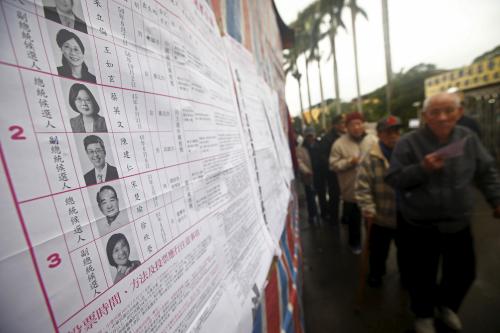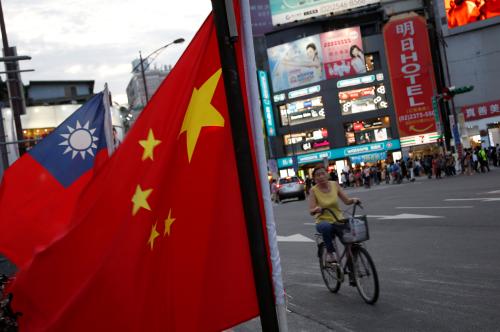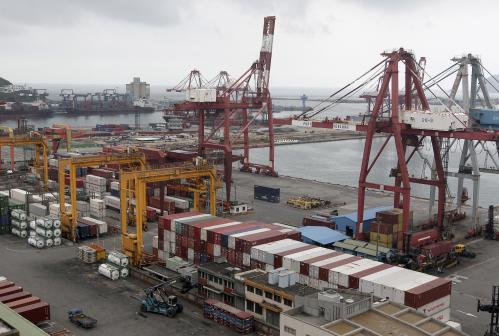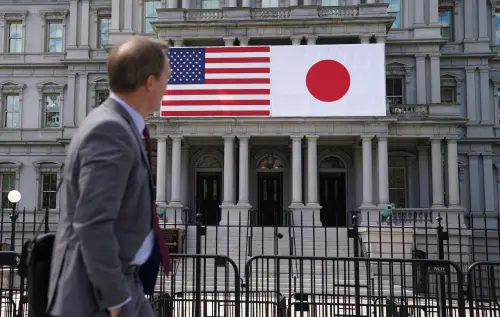Governing Taiwan’s vibrant democracy is not easy. President Tsai Ing-wen was elected in 2016 with a strong mandate for change and a large Democratic Progressive Party (DPP) majority in the Legislative Yuan (LY). But her first year in office has not been smooth. Her priorities have been clear and energetically pursued but progress has been slow and buffeted by controversies.
Economic challenges
Observers abroad have focused on how Tsai has maintained a fragile calm in cross-Strait relations. For Tsai, that relative calm is useful because it allows her to focus on more important domestic priorities, which fall into two general areas: restoring economic growth and implementing political reforms. Taiwan has suffered from nearly two decades of subpar growth. During her predecessor President Ma Ying-jeou’s eight years in office, GDP growth averaged just 2.5 percent and is estimated at a meager 1.5 percent in 2016.1 Since the economy is a main pillar of Taiwan’s national resilience, restoring growth is essential.
Tsai campaigned with promises to reinvigorate the economy, increase job opportunities, and revive a sense of optimism among Taiwan’s millennials. In order to do this, Taiwan needs to diversify an economy heavily dependent on its competitive semiconductor industry. Tsai’s two predecessors had also sought, without success, to encourage new industries and restore growth. Candidate Tsai, with the help of Lin Chuan, who was subsequently appointed premier, chose to focus public attention on five industries: green energy, smart machinery, the internet of things (IoT), biomedicine, and defense. Such industrial policies are a standard feature in Taiwan, and some of these industries had been promoted before. Tsai’s principal innovation has been to link those industries to specific localities. For example, the smart machinery effort will be located in Taichung, the center of Taiwan’s machine tool industry. Green energy will be centered in Tainan and IoT in Taoyuan. One purpose is to get local buy-in from activist mayors, but politics are also involved, as four of the five locations are led by DPP mayors. Since her election, Tsai has added two further areas of emphasis to her five-industry plan: advanced agriculture and the circular (recycling) economy.
Predictably, implementation has been slow at the start of the new administration. Green energy has been the most urgent task because Tsai has recommitted to phasing out Taiwan’s substantial dependence on nuclear power (16 percent of total power generation) by 2025 and because affordable, reliable energy is a major concern of investors in several key industries. Consequently, the administration has already signed several contracts with foreign and domestic firms for wind farms and solar projects. In March, the Executive Yuan announced an eight-year NT$50 billion ($1.65 billion) infrastructure plan for green energy investment. The ambitious goal is to expand renewable energy from 5 percent of supply in 2016 to 20 percent by 2025.2
The National Development Council (NDC) has established the Asian Silicon Valley Development Agency (ASVDA) in Taoyuan to encourage IoT startups. The ASVDA has signed agreements with leading Silicon Valley firms to establish IoT centers in Taoyuan. Defense is another sector where the Tsai administration has announced specific steps. The government has signed a contract with the China Shipbuilding Corporation for the design and production of Taiwan’s indigenous submarine in Kaohsiung and a contract with the Aerospace Industrial Development Corporation (AIDC) for the production of jet trainers. President Tsai took the unusual step of appointing a general with an engineering background, Gen. Chang Kuan-chung, to oversee these indigenous production programs as deputy minister of defense for armaments.
Premier Lin Chuan has proposed a special budget of NT$880 billion ($29 billion) for an eight-year “Forward-looking Infrastructure Construction Project.” The green energy plan is one component of this larger project. The other major elements are water infrastructure and conservation, digital infrastructure to support the five-sector plan, and rail development. As of May 2017, this special budget was being reviewed in the LY.
The NDC sees talent, venture funding, and international linkages as key challenges to restoring growth. Therefore, it is developing plans to encourage foreign talent to work in Taiwan, to persuade Taiwanese IT talent abroad to return, and to encourage linkages where promising Taiwanese can work or study at centers of excellence in target industries in OECD countries. The Executive Yuan (EY) sent the NDC’s proposed legislation on attracting foreign professional talent to the LY in April. Legislation for financial technology innovation is being drafted. The NDC is also in talks with Qualcomm to establish an investment fund for startups as a part of the Asian Silicon Valley project. Minister of Science and Technology Chen Liang-gee traveled to Boston and Silicon Valley in March 2017 to discuss linkages with biomedical and IT firms and research institutes.
The administration has shown considerable energy in advancing Tsai’s economic agenda. However, it is too early to estimate what success they will have in stimulating private sector innovation. Fortunately, their efforts are occurring at a time when the international economy is recovering and when Taiwan’s exports have been increasing and unemployment falling. Nevertheless, the most recent official (DGBAS) estimate of 2017 growth is only 1.9 percent, which underlines the challenge of reviving robust growth.3
Reducing economic dependence on China
This activity illustrates that Tsai’s economic plan focuses on domestic innovation and development. While President Ma had similar domestic programs, he had looked to expand ties with China as the main driver for growth. By contrast, a major goal of Tsai’s economic policy is to reduce Taiwan’s heavy dependence on China, which currently accounts for about 40 percent of Taiwan’s exports.4 Beyond her focus on the domestic economy, there were two pillars to Tsai’s initial efforts to reduce that dependence: participation in the Trans-Pacific Partnership (TPP) and her New Southbound Policy (NSP).
President Trump’s decision to withdraw the United States from the TPP was a heavy blow to Taiwan. While the other TPP states may seek to establish the trade deal without the United States, Trump’s decision forced the Tsai administration to regroup. Tsai has stressed her desire to move toward a bilateral economic agreement with the Trump administration. Similarly, she would like to build on Taiwan’s existing bilateral investment agreement with Japan. However, these bilateral approaches immediately confronted highly controversial domestic political obstacles: opposition to both imports of U.S. pork containing the growth hormone ractopamine and imports of Japanese vegetables from the Fukushima nuclear disaster area. The way forward with both countries is quite uncertain.
The NSP is one of Tsai’s highest profile initiatives. It aims to expand educational, cultural, tourist, and economic ties not only with the 10 ASEAN countries but also with Australia, New Zealand, India, and five other countries in South Asia. The Tsai administration points to evidence that the growth of visitors from NSP countries in 2016 helped compensate for the decline in tourism from China as an early benefit of its NSP policy. Despite the broad scope of the NSP, expanding trade and investment ties with the NSP countries, particularly ASEAN, is the key to its usefulness in reducing dependence on China. ASEAN already represents Taiwan’s second largest market after China, accounting for 18 percent of Taiwan exports in 2016, ahead of the United States (12 percent) and Japan (7 percent).5 The Tsai administration’s ability to assist Taiwan companies in ASEAN is severely limited by Beijing’s diplomatic leverage. Although Tsai has sought to soften Beijing’s opposition to the NSP, Beijing clearly sees it as a significant challenge to its own goal of deepening cross-Strait economic ties. Consequently, new governmental investment or economic agreements with ASEAN countries are unlikely.
Tsai’s political reform agenda
Tsai’s other domestic priority is political reform. This involves establishing a more inclusive and transparent policymaking process and adopting pension and judicial reforms. Tsai has created a more open, inclusive climate, mostly through reforming the legislative process in the LY. The opaque caucus consultation process is used less frequently, and debate of legislation now occurs regularly in LY committees whose proceedings are broadcast on live television. In addition, Tsai has convened inclusive meetings on contentious issues including indigenous peoples’ transitional justice and same-sex marriage, though the results have not been conclusive or satisfactory to all participants. Although Tsai has encouraged an open, inclusive process, knowing when to intervene to build consensus and when to end discussion and call for a decision has proven difficult.
Considerable progress has been made on pension reform. As in other developed countries, this is a highly contentious issue that must be confronted because of its budget implications for other government priorities. In Taiwan, teachers, civil servants, and the military, who have been favored with overly generous pension provisions, have protested proposed changes. The EY, Examination Yuan, and opposition parties have put forward competing legislative drafts. When debate on these bills began in the LY, senior officials and legislators were attacked in violent demonstrations. President Tsai responded by saying that the legislation must be debated and passed even in the face of such opposition. By submitting administration proposals, Tsai met a commitment to have comprehensive proposals on the table within her first year. However, an April 2017 opinion poll by the TVBS television network showed 46 percent disapproval of the government’s handling of the pension issue, 29 percent approval, and 26 percent undecided.6 The LY still is debating various pension bills, and Tsai is determined see legislation adopted in 2017.
However, judicial reform has not proceeded so well. At her inauguration, Tsai outlined plans to convene a national congress on judicial reform in October 2016. She immediately ran into problems when her proposed convener of a preparatory committee for the National Conference on Judicial Reform was forced to withdraw. Tsai stepped in to personally convene the renamed Presidential Office Organizing Committee that was launched in November 2016. Preparatory work under two co-conveners, involving five subcommittees with some 75 broadly representative members, has proceeded actively since February. However, in late April, two subcommittee members quit amid internal disagreements and publicly criticized the preparatory process. A date for the National Conference has not yet been announced.
Challenges from within
Unfortunately, second tier issues were brought forward by the LY and civil society to distract public attention from Tsai’s main priorities. For instance, Tsai had laid out a three-year plan for addressing transitional justice issues from the Kuomintang (KMT) era, but the DPP caucus in the LY was determined to use its new majority to carry out the long-proposed attack on the KMT’s financial assets. In July 2016, the LY passed the “Act Governing the Handling of Ill-gotten Properties of Political Parties and Their Affiliate Organizations.” In August, the EY established the Ill-gotten Party Assets Settlement Committee, which moved swiftly to freeze KMT assets and launch a far-reaching investigation of KMT-related organizations. This effort has poisoned relations with the KMT, undercutting Tsai’s hopes to promote inter-party reconciliation. Governing Taiwan is not easy when the DPP contains many diverse elements, each with their separate interests and priorities.
Almost immediate after her inauguration, DPP labor supporters began demanding the restoration of public holidays canceled by the previous KMT government. These demands reopened issues related to the implementation of 40-hour workweek regulations, and the DPP-LY caucus promised to restore the holidays. Labor demands were fueled by awareness that Taiwan’s annual hours worked is one of the highest in the developed world (2,134 hours compared to the OECD average of 1,771).7 However, the business community opposed efforts to shorten the workweek and restore holidays. The demands put Tsai in a political bind and consumed time in the LY. Eventually, the administration and DPP caucus reached a compromise that modified the workweek but did not restore the holidays. After much debate, Tsai instructed the DPP caucus to pass the bill. The compromise left both labor and business dissatisfied, and Tsai’s approval rating took a significant hit. An April 2017 TVBS opinion poll showed 44 percent disapproval, as opposed to 17 percent approval for the new workweek regulations, with 39 percent undecided.8
Transitional justice for indigenous people also led to controversy. In August 2016, President Tsai, the first president with some aboriginal roots, formally apologized to the indigenous peoples for centuries of mistreatment. This predictably led to demands for restitution of traditional lands. The administration agreed to address issues involving government-owned land, but not addressing questions concerning privately-owned land provoked criticism. During the campaign, Tsai announced support for same-sex marriage. This issue, too, has elicited intense controversy both over the substance of the issue and over procedural questions between those advocating separate legislation and other supporters proposing amending the civil code. Tsai brought those divergent groups together in an unsuccessful attempt to craft a solution. Although candidate Tsai had not addressed how legalization of same-sex marriage should be achieved, President Tsai is now criticized by advocates for not throwing her full support behind separate legislation. In Taiwan’s open democratic society with many divergent civil society voices, governing is not easy.
Managing cross-Strait relations
A consistent cross-Strait policy has been a hallmark of Tsai’s first year. During the campaign Tsai promised a policy that would be “consistent, predictable and sustainable.”9 Saying she understood her responsibility to maintain peace, she made maintaining the status quo of peace and stability the goal of her policy. To this end, she has avoided answering questions about whether she accepts or rejects China’s demand that she endorse the 1992 Consensus on one China.
Rather than directly addressing the 1992 Consensus, Tsai said in her inaugural address that, “Since 1992, over twenty years of interactions and negotiations across the Strait have enabled and accumulated outcomes which both sides must collectively cherish and sustain; and it is based on such existing realities and political foundations that the stable and peaceful development of the cross-Strait relationship must be continuously promoted.” In addition she said, “The new government will conduct cross-Strait affairs in accordance with the Republic of China Constitution, the Act Governing Relations Between the People of Taiwan Area and the Mainland Area, and other relevant legislation.”10 This was an important pledge that could be interpreted as promising to conduct relations within a one China context.
This language was designed to show that Tsai was striving to take into account Beijing’s views without violating her own principles, which she expressed by saying her policy would be based on “the democratic principle and prevalent will of the people of Taiwan.” It appeared that her position had developed in the context of some unacknowledged back channel communications with Beijing. The Beijing leadership understood that Tsai’s policy was different from former President Chen Shui-bian’s provocative pro-independence policies. However, Beijing chose to focus on the fact that Tsai had still not clearly endorsed one China. The Taiwan Affairs Office (TAO) statement condescendingly called the inaugural address an “incomplete test answer.”11
Tsai chose her external affairs team carefully. The head of the National Security Council is Joseph Wu Jau-shieh, a DPP colleague who had advised her on cross-Strait and foreign policy issues throughout the campaign. David Lee Da-wei, a widely respected senior diplomat, is foreign minister, and Katherine Chang Hsiao-yueh, another respected diplomat, is chairperson at the Mainland Affairs Council (MAC). As was expected, this team has conveyed the consistent, predictable policy that Tsai promised. However, pro-independence members of her party have attacked Tsai by calling for the resignation of these diplomats. Partly in response to such criticism, Tsai subsequently appointed Tien Hung-mao as chairman of the Straits Exchange Foundation (SEF). Tien is a pro-DPP academic who served as foreign minister under former President Chen. Unsurprisingly, his appointment was not welcomed in Beijing.
For the first months of Tsai’s presidency, Beijing kept actively pressing her to accept the 1992 Consensus on one China. Beijing suspended the institutionalized communication channels both between the MAC and TAO and between the SEF and its counterpart, the Association for Relations Across the Taiwan Strait (ARATS), and repeatedly underlined what was being lost through the lack of communications. Among the various steps taken by Beijing, the most important was to block the International Civil Aviation Organization (ICAO) from again inviting Taipei as a guest at the ICAO Assembly in September 2016. Beijing then suggested Tsai should address its concerns in her national day address on October 10. This provoked a sharp response from Tsai rejecting this pressure and commenting that Taiwan needed to reduce its reliance on China. In her address, Tsai made clear that her policy would not change, saying, “Our pledges will not change, and our goodwill will not change. But we will not bow to pressure, and we will of course not revert to the old path of confrontation.”12
Over the past year, the Tsai administration has suggested ways to restore dialogue and called for developing a new model for maintaining cross-Strait peace. The KMT opposition has blamed cross-Strait problems on Tsai’s unwillingness to accept the 1992 Consensus. Some low-level contacts have occurred under the 23 existing cross-Strait agreements. Prisoners and detainees have been exchanged, and the special cross-Strait flights needed over Chinese New Year were worked out. However, Beijing has kept the institutionalized communications channels tightly closed. A series of events in March and April of 2017 have illustrated the practical costs of no communications.
In March, Taiwan police arrested Zhou Hongxu, a former mainland exchange student in Taiwan, on suspicion of being engaged in espionage. Ten days later, Lee Ming-che, a civil society activist from Taipei who had previously worked for the DPP, disappeared in Guangdong. Commentators speculated that the detention was linked to Zhou’s arrest. Beijing refused requests from Taipei for information and blocked Lee’s wife from travelling to Beijing. After demands from Taiwan and elsewhere, Beijing eventually announced that Lee was under investigation for damaging national security. In April 2017, a PRC tourist left his group in Taipei and sought political asylum. Taipei immigration personnel quickly determined that the tourist did not have a valid claim, and the individual chose to return to China, an outcome that was appreciated by Beijing. Much about these cases remain unclear, and Lee remains under investigation. But the events illustrate the cost of closed institutional channels and the difficulty of managing such issues through discrete contacts absent those channels.
As the first anniversary of Tsai’s inauguration approached, Taipei was awaiting an invitation to the annual World Health Assembly (WHA), which Taiwan has attended in recent years. On May 8, 2017, the TAO announced that Taiwan would not be able to attend because it had not accepted the 1992 Consensus and blamed the DPP for that outcome. Beijing’s decision will further poison the atmosphere of cross-Strait relations.
The United States and Japan
President Tsai’s relations with the Obama administration continued the excellent cooperative ties Washington had with the outgoing Ma administration. The surprise election of Donald Trump sparked both hopes and concerns in Taipei. When the opportunity arose, President Tsai decided to hold an unprecedented congratulatory phone call with President-elect Trump. Trump’s subsequent tweeting converted what was at first welcomed as a breakthrough into a dangerous risk. Trump’s public questioning of one China seriously complicated Tsai’s careful effort to maintain the status quo by avoiding that question. Pro-independence supporters saw a chance to undo Washington’s one China policy. President Tsai responded that priority must be given to preserving cross-Strait and regional peace, and said that Taiwan’s ties with the United States and China are equally important. When Trump subsequently told President Xi Jinping that the United States would honor its one China policy, concerns in Taipei eased.
Tsai has also sought to improve ties with Japan. She named two prominent DPP figures, Frank Hsieh Chang-ting and Chiou I-jen, to handle relations with Japan. The two sides took symbolic steps to enhance ties by changing the names of their authorized representative bodies in ways welcomed by Taipei. This March, Jiro Akama, the deputy minister of internal affairs and communications, visited Taipei for a tourism conference. Akama was the highest ranking Japanese official to visit Taiwan since the end of diplomatic relations in 1972, a development that Beijing predictably protested.
Conclusion
President Tsai has shown strong leadership, with a clear focus and sustained energy in pursuing her priorities. She has gained considerable credit internationally for her firm careful handling of cross-Strait issues. But at home, her approval ratings have fallen rapidly. According to TVBS, shortly after her inauguration Tsai enjoyed approval ratings with a positive margin of 29 points (47 percent approval vs. 18 percent disapproval). By October 2016 the positive advantage had ended. In the most recent poll in January 2017, Tsai had a negative margin of 19 percent (47 percent disapproval vs. 28 percent approval).13 Various polls indicate that it is primarily criticisms of Tsai’s domestic policies that contribute to her declining approval rating. Despite Tsai’s leadership and accomplishments, it is hard to win credit for governing Taiwan.
-
Footnotes
- Derived from data in “Latest Indicators,” National Statistics of ROC, http://eng.stat.gov.tw/.
- Ku Chuan and Elizabeth Hsu, “NT$300 billion eyed for green energy, water infrastructure,” CNA, March 20, 2017, http://focustaiwan.tw/news/aeco/201703200022.aspx.
- “Latest Indicators,” Directorate General of Budget, Accounting and Statistics, Executive Yuan, ROC, http://eng.dgbas.gov.tw/.
- “Table 2: Transit Trade between Taiwan and Mainland,” Mainland Affairs Council, http://www.mac.gov.tw/public/MMO/MAC/272_2.pdf.
- Jing Bo-jiun, “‘Go South’, Going South? Assessing Taiwan’s ‘New Southbound’ Policy and the China Factor in Southeast Asia” (unpublished paper), Table 2.1.
- “Public Opinion on Pension Reform” [Chinese], TVBS Poll Center, April 21, 2017, http://other.tvbs.com.tw/export/sites/tvbs/file/other/poll-center/0604181.pdf.
- Sean Lin, “Taiwan No. 3 in work hours: union,” Taipei Times, July 13, 2016, http://www.taipeitimes.com/news/Taiwan/archives/2016/07/13/2003650939.
- “Public Opinion on Workweek Reform Implementation” [Chinese], TVBS Poll Center, April 11, 2017, http://other.tvbs.com.tw/export/sites/tvbs/file/other/poll-center/0604061.pdf.
- “Full text of Tsai’s victory speech at international press conference,” Democratic Progressive Party, January 16, 2016, http://www.dpp.org.tw/news_content.php?sn=8770.
- “Inaugural Ceremony of the Fourteenth-Term President and Vice President of the Republic of China (Taiwan): Inaugural Address,” Office of the President, Republic of China (Taiwan), http://english.president.gov.tw/Default.aspx?tabid=1574.
- “Full text of mainland’s Taiwan affairs authorities’ statement on cross-Straits relations,” Xinhua, May 20, 2016, http://news.xinhuanet.com/english/2016-05/20/c_135375950.htm.
- “ROC’s 105th Double Tenth National Day Celebration,” Office of the President, Republic of China (Taiwan), October 10, 2016, http://english.president.gov.tw/default.aspx?tabid=1124&itemid=38137&rmid=3048.
- “Public Opinion on President Tsai Ing-wen’s Approval Rating through Eight Months in Office, Table 1” [Chinese], TVBS Poll Center, January 19, 2017, http://other.tvbs.com.tw/export/sites/tvbs/file/other/poll-center/0601161.pdf.









Commentary
Op-edGoverning Taiwan is not easy: President Tsai Ing-wen’s first year
May 17, 2017